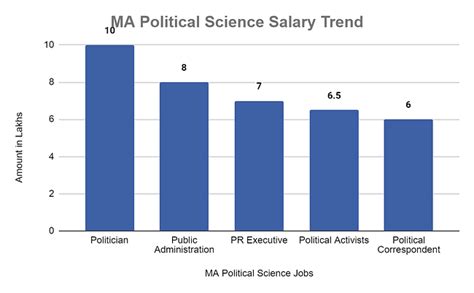Are you considering a career in political science, but curious about what kind of salary you can expect? In this blog post, we will delve into the world of political science salaries, providing insight into the average earnings in the field, as well as the various factors that can impact your potential income. From the influence of a political science degree to the disparity between government and private sector salaries, we will explore the wide range of economic possibilities within this profession. We will also examine geographical disparities, job title-specific salaries, entry-level earnings, opportunities for advancement, and the gender pay gap in political science. Additionally, we will compare political science salaries to those in other fields, offering a comprehensive look at the earning potential in this dynamic and impactful field. Whether you’re a current student or a seasoned professional, this blog post will provide valuable information to assist you in navigating the financial landscape of political science careers.
Table of Contents
Average Political Science Salary
Political science is a field that offers a wide range of career opportunities, but many individuals are often curious about the average salary they can expect to earn in this profession. According to recent data, the average political science salary in the United States is around $64,000 per year. However, it’s important to note that this figure can vary significantly based on several factors.
One of the most significant factors affecting political science salaries is the individual’s level of education and experience. Those with advanced degrees, such as a master’s or PhD, tend to earn higher salaries than those with just a bachelor’s degree. Additionally, individuals who have gained several years of experience in the field may also command higher pay.
Another factor that influences political science salaries is the specific job title and sector in which an individual works. Those in government positions, such as working for federal agencies or in legislative roles, may earn different salaries than those working in the private sector, such as for a lobbying firm or consulting company.
Geographical disparities also play a significant role in political science income. Individuals working in larger cities or in areas with a high cost of living may command higher salaries than those in more rural or lower-cost areas. As such, it’s important for individuals to consider the geographic location when evaluating potential salary expectations in their political science careers.
Factors Affecting Political Science Salaries
When considering a career in political science, it’s important to understand the various factors that can impact your potential salary. One of the main factors affecting political science salaries is the level of education and experience. Typically, those with higher levels of education, such as a master’s or PhD, will often command a higher salary than those with just a bachelor’s degree. Additionally, gaining experience through internships or entry-level positions can also lead to higher earning potential.
Another key factor that can impact political science salaries is the specific area of specialization or concentration within the field. For example, those who specialize in international relations or public policy may have different earning potential than those who focus on local government or political theory. It’s important to consider the demand and market value for your specific area of expertise when assessing potential salary levels.
Location is also an important factor to consider when evaluating political science salaries. Salaries can vary significantly based on the region or city in which you work. Urban areas and certain regions may offer higher salaries due to cost of living or demand for political science professionals.
Lastly, the type of employer can significantly impact political science salaries. Those working in government positions may have different salary structures than those working in the private sector. Additionally, non-profit organizations, consulting firms, and think tanks may offer different salary ranges. Considering the company or organization’s budget and funding sources is important when evaluating earning potential in political science.
Political Science Degree and Earnings
When it comes to pursuing a degree in political science, many individuals may have concerns about potential earnings in the field. While the salary for political science graduates can vary based on a number of factors, it’s important to consider the potential for financial success with this type of degree.
Factors influencing the earnings of political science degree holders may include the level of education achieved, the type of employer, and the geographical location of the job. For example, those with advanced degrees, such as a Master’s or Ph.D. in political science, may have access to higher-paying positions than those with just a Bachelor’s degree.
Additionally, individuals working in the government sector may have different salary potential than those working in the private sector. Government jobs may offer more stability and benefits, while private sector positions could potentially provide higher earning potential based on performance and market demand.
Despite potential variations in income, a degree in political science can still provide individuals with valuable skills and the opportunity to pursue a rewarding career in fields such as public policy, law, or international relations.
Government vs. Private Sector Salaries
When considering a career in political science, one of the biggest factors to consider is whether to work in the public or private sector. Both options offer unique pros and cons, including differences in salary. In the public sector, such as working for the government, political science graduates can expect to earn a steady and secure income. Government positions often come with predictable pay scales, benefits, and job security, making it an attractive option for those seeking stability.
On the other hand, the private sector may offer higher potential salaries and bonuses. Political science graduates working in private firms and corporations have the potential to earn more through performance-based pay and bonuses. The private sector may also offer more flexibility and room for career advancement, allowing individuals to climb the ladder and earn higher salaries as they gain experience and expertise in their field.
However, the private sector can also come with higher levels of competition, job insecurity, and the potential for longer working hours. It’s important for individuals to weigh the pros and cons of both sectors before making a decision, as salaries are just one of many factors to consider when choosing a career path in political science.
Ultimately, the decision between working in the government or private sector comes down to personal preferences, career goals, and desired salary and benefits package. Whether it’s the stability of a government position or the potential for higher earnings in the private sector, individuals pursuing a career in political science have the flexibility to explore their options and find the best fit for their unique needs and aspirations.
Geographical Disparities in Political Science Income
Political science is a field that offers a wide range of career opportunities, but the income potential can vary significantly based on location.
One of the key factors affecting political science salaries is the geographical location where professionals are employed. Salaries for political science professionals can be influenced by the cost of living in different areas, as well as the demand for political science expertise in those regions.
For example, political science professionals working in major metropolitan areas or state capitals often command higher salaries due to the higher cost of living and the concentration of government and political organizations. On the other hand, those working in rural areas or smaller towns may earn lower salaries due to the lower cost of living and limited demand for political science expertise.
It’s important for individuals pursuing careers in political science to consider the geographical disparities in income and the cost of living when planning their career paths. Understanding the variations in political science salaries across different regions can help professionals make informed decisions about where to work and how to negotiate their compensation packages.
Political Science Salaries by Job Title
Political science is a field with a wide range of job opportunities, each varying in terms of salary and earning potential. Political science graduates can find employment in various sectors such as government, non-profit organizations, education, research, and private sector companies.
Job titles in the field of political science can include roles such as policy analyst, political campaign manager, legislative assistant, political consultant, lobbyist, and public relations specialist, among others. Each of these job titles may offer different salary ranges and potential for career growth.
For example, a policy analyst working in a government agency may have a different earning potential compared to a political consultant working in a private firm. Factors such as experience, location, and specific skill sets can also impact the salaries offered in different political science job titles.
It’s important for individuals pursuing a career in political science to research and understand the earning potential of different job titles within the field in order to make informed career decisions.
Entry-Level Political Science Salaries
Entry-level political science salaries can vary widely depending on a variety of factors. When starting out in the field of political science, it’s important to consider the average starting salary as well as the potential for growth and advancement over time. This can help prospective political science professionals make informed decisions about their career path and financial goals.
One of the major factors affecting entry-level political science salaries is the type of employer. Many political science graduates may seek employment in the government sector, while others may pursue opportunities in the private sector. The salaries offered by government agencies may be more standardized and predictable, while those in the private sector can vary greatly depending on the size and nature of the organization.
Geographical disparities also play a significant role in entry-level political science salaries. Salaries can differ greatly based on the location of the job, with higher cost of living areas generally offering higher starting salaries. It’s important for aspiring political scientists to research and consider the regional differences in pay when evaluating job opportunities.
Another important consideration for entry-level political science salaries is the specific job title or role. Some entry-level positions may offer higher salaries and faster advancement opportunities, while others may provide a more gradual path to higher earnings. It’s crucial for recent graduates to carefully evaluate the potential for growth and earning potential within different positions and organizations.
Advancement and Higher Pay in Political Science
When it comes to advancement and higher pay in political science, professionals in this field have various opportunities to climb the career ladder and increase their earning potential. One of the key factors affecting the potential for advancement and higher pay in political science is the level of education. Individuals with advanced degrees such as a master’s or PhD in political science generally have better prospects for moving into higher-paying positions within the field.
Another important aspect to consider when it comes to advancement and higher pay in political science is the level of experience. As professionals gain more experience in the field, they are often able to take on more senior roles that come with greater compensation. Additionally, obtaining specialized certifications or training in areas such as public policy or international relations can also contribute to higher pay and advancement opportunities.
Networking and professional connections play a significant role in the advancement and higher pay in political science. Building strong relationships with key figures in the field can open doors to new opportunities for advancement, whether it’s through mentorship, recommendations, or access to exclusive job openings. Furthermore, staying updated with the latest developments and trends in political science through attending conferences, workshops, and industry events can also make a difference in career advancement and earning potential.
Overall, advancement and higher pay in political science are achievable through a combination of advanced education, relevant experience, ongoing professional development, and effective networking. By actively pursuing these avenues, individuals in the field of political science can enhance their career prospects and work towards increasing their earning potential.
Gender Pay Gap in Political Science
The gender pay gap in Political Science is a prevalent issue that continues to affect the field. Despite progress in many areas of the workforce, women in political science still face lower salaries compared to their male counterparts. This disparity exists across various levels of the profession, from entry-level positions to higher-ranking roles. The reasons behind this gender pay gap are complex and multifaceted, encompassing factors such as gender discrimination, unconscious bias, and work-life balance challenges.
One of the key factors contributing to the gender pay gap in Political Science is inequality in job opportunities and career advancement. Women are often underrepresented in leadership roles within political institutions and organizations, resulting in limited access to higher-paying positions. Additionally, there is evidence to suggest that women in political science are less likely to negotiate for salary increases or promotions, further perpetuating the gender pay gap.
Addressing the gender pay gap in Political Science requires a concerted effort from both individuals and institutions within the field. This includes implementing anti-discrimination policies, promoting diversity and inclusion initiatives, and providing mentorship and support for women pursuing careers in political science. By actively working to close the gender pay gap, the field of political science can create a more equitable and inclusive environment for all professionals.
Ultimately, the gender pay gap in Political Science poses a significant challenge that necessitates ongoing attention and action. By addressing the underlying factors contributing to this disparity and advocating for equitable treatment and opportunities for all individuals, the field can work towards a more balanced and fair compensation structure for political science professionals.
Comparing Political Science Salaries to Other Fields
When considering a career in political science, it is important to understand how the salaries in this field compare to those in other areas of expertise. Political science salaries can vary greatly depending on the job title, geographic location, and sector of employment. It is essential to compare these figures to the salaries in other fields to make an informed decision about pursuing a career in political science.
One of the key factors affecting political science salaries is the job title. For example, a political scientist may earn a different salary compared to a policy analyst or a legislative assistant. It is important to compare these salaries to similar positions in other fields to gauge how political science salaries stack up.
Another important aspect to consider when comparing political science salaries to other fields is the sector of employment. Salaries in the government sector may differ significantly from those in the private sector. It is essential to analyze these disparities and understand how they compare to other fields of work.
Geographical disparities also play a significant role in determining political science salaries. The cost of living and demand for political science professionals can vary greatly from one location to another. Comparing these geographical differences to other fields can provide valuable insights into potential salary discrepancies.





